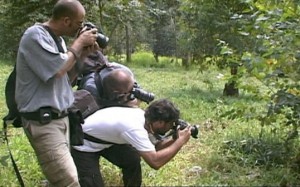 Renzo Martens is a cure for empathy fatigue.
Renzo Martens is a cure for empathy fatigue.
In his documentary Enjoy Poverty he proposes that poverty is a resource that is already traded by media and aid agencies, but that it rightly belongs to the poor. He takes Congolese photographers under his wing to show them how best to capture and commodify pain and suffering. In one memorable scene, he dispassionately handles a dying child – malnourished and in great distress – as a prop in his lesson.
Of course, it is easier to accept injustice and inequality in the abstract, from a great distance, or on an institutional level. When our actions put price pressure on coffee, for example, we may be serenely untroubled by the moral questions relating to production. But we are unable to accept the same injustices when they occur on a personal level. Martens seems to have found a way to personify the status quo, and if we find his behaviour repugnant his work has shortened the empathic distance between audience and subject.
When I saw the documentary, Martens was on hand at Salon Populaire to absorb the audience’s discomfort and anger. Actually, I expected the panel discussion to reveal a distinction between Renzo Martens the character, the intrepid anti-hero travelling through the Democratic Republic of Congo promising that he is not here to help, and Renzo Martens the artist – self aware, deliberate, and humane. But no such distinction was made, and the paradox remained unresolved.
But this paradox is perhaps the strength of the work. Enjoy Poverty is not powered by satire or irony: it is compelling because Martens has remade himself in order to create it.
